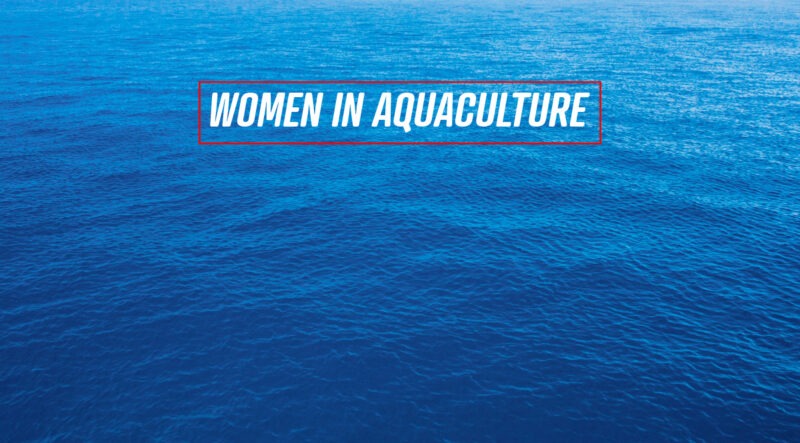Young Professionals: Women in Canadian Aquaculture
Mentorship and opportunities abound for women in the salmon farming industry in British Columbia.
By Samantha Bacchus McLeod
SeaWestNews
Moderators: Michelle Franze, Manager of Communications, Partnerships, and Community, BC Salmon Farmers Association & Sam Tomkinson, Regulatory Specialist, Grieg Seafood BC
Panelists: Emily Warren, Licence and Development Officer, Cermaq Canada – Kirstyn Hallberg, Environmental Specialist, Grieg Seafood BC – Kaitlin Guitard, Fish Health and Food Safety, Lab Manager, Mowi Canada West – Kathryn Smith, Aquaculture Veterinarian, Grieg Seafood BC
Here are some insights from the Women in North American Aquaculture Series.
These young women stand united as the young professionals of salmon farming in British Columbia. They are a diverse group of women leaders from every aspect of BC’s salmon farming sector. From farm and hatchery technicians to managers, water quality technicians, transportation managers and beyond, they represent a wide array of roles, including veterinarians, communicators, biologists, fish processors, and various environmental specialists.
In the world of aquaculture, the wildly innovative call of the industry is a massive draw for professionals eager to make a difference in the world of farming. This vast potential within the sector that is energised by constant innovation, research, and development, propels it into the arena of young job hunters.
But it is not just about being the leader of the pack when it comes to innovation, sustainability, and farming. It is also about job security and the growing support for diversity, particularly the role of women in aquaculture, that provides a supportive environment.
Even in remote environments, working as the only female among male colleagues, the sense of equality and respect is noticeable, which allows for a sense of safety. The industry’s commitment to gender equality and support for women is definitely on display, and while there is still work to be done to achieve a 50/50 gender split, considerable strides have been made since the inception of salmon farming in the 70s and 80s.
When it comes to inclusion, British Columbia’s aquaculture in coastal waters would not exist without the collaboration of First Nations groups and partners. Stakeholders – investors and companies, First Nations groups and partners, provincial and federal governments – must ramp up the ongoing effort in discussing and planning future developments that will ensure the sustained growth of the industry, and thus its valuable contribution to food security in Canada, and beyond.
Mentorship and opportunities abound for women in the salmon farming industry in British Columbia. Nevertheless, despite the plethora of opportunities and the strong support system, challenges inevitably arise, particularly when it comes to communications. The distinct reactive challenges on social media faced by women in the sector is disparate compared to their male counterparts.
Combating misinformation, that runs fathoms deep, about the salmon farming sector is sometimes impossible to stay afloat of and this is made ever worse by the hostile environment of social media platforms. Misinformation and social media; it is like a drowning woman being tossed an anchor instead of a lifebuoy. The toll it takes on a person’s mental well-being is unfathomable. But these young professional women keep swimming together, becoming stronger and stronger in schooling others.
When friends and acquaintances question these young professionals’ commitment to the environment, they respond with open dialogues to correct misinformation and shed light on their crucial work in the field of raising sustainable food to feed the world. These young professionals also inform all and sundry about the sustainable and innovative practices of salmon farming in BC, and they invite others to partake in coherent dialogue about this valuable sector. And last but certainly the most important when it comes to social media abuses, they work at maintaining a resilient mindset and good mental health by setting boundaries, joining online and offline groups that uplift each other, and of course, remaining authentic to self and industry.
The episode covers a lot more on what women in the aquaculture industry really think about. It is a great segment where one can garner information and insight, and learn about the joys and challenges of the industry, including the dedication and the passion it takes to raise sustainable seafood.

